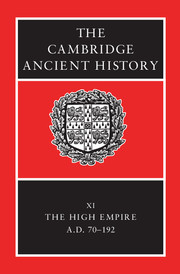Book contents
- Frontmatter
- PART I NARRATIVE
- PART II GOVERNMENT AND CIVIL ADMINISTRATION
- PART III THE EMPIRE
- PART IV ROME, ITALY AND THE PROVINCES
- PART Va ECONOMY AND SOCIETY
- PART Vb ART AND CULTURE
- 30 Literacy
- 31 Literature and sophistic
- 32 Philosophy
- 33 Medicine
- 34 Art and architecture
- 35 Religion
- Chronological Table
- BIBLIOGRAPHY
- Index
- 1 The Roman world in the time of Marcus Aurelius
- 7 The Danube provinces
- References
32 - Philosophy
from PART Vb - ART AND CULTURE
Published online by Cambridge University Press: 28 March 2008
- Frontmatter
- PART I NARRATIVE
- PART II GOVERNMENT AND CIVIL ADMINISTRATION
- PART III THE EMPIRE
- PART IV ROME, ITALY AND THE PROVINCES
- PART Va ECONOMY AND SOCIETY
- PART Vb ART AND CULTURE
- 30 Literacy
- 31 Literature and sophistic
- 32 Philosophy
- 33 Medicine
- 34 Art and architecture
- 35 Religion
- Chronological Table
- BIBLIOGRAPHY
- Index
- 1 The Roman world in the time of Marcus Aurelius
- 7 The Danube provinces
- References
Summary
INTRODUCTION
Trends in philosophy are not readily circumscribable by historical periods, and, especially since no attention was paid to philosophy in volume X, it will not be out of place to begin our story somewhat earlier, at least in a summary fashion.
In fact, a more significant starting-point may be seen in the earlier half of the first century B.C., or, to be specific, in 88 B.C., the year in which Mithridates captured Athens, which in turn resulted in Sulla's recapture of the city in 86, with its attendant destruction of both the Platonic School in the Academy and the Peripatetic School in the Lyceum, and the consequent scattering of philosophers in the directions of Rome and Alexandria. This event need not by itself have provoked changes of direction in philosophy (and indeed, in the case of the Platonic School, a change had been brewing for some time), but this period, perhaps as a consequence of its high degree of political unrest and upheaval, does seem to have given rise to a series of new developments, both in philosophy proper and in people's attitude to the world in general.
It is dangerous, perhaps, to employ such concepts as ‘desire for authority’ or ‘longing for certainty’ as a decisive element in intellectual history – the use of the concept of an ‘age of anxiety’, after all, to characterize the second and third centuries A.D. has come under fire in recent years. However, it is arguable, I think, that even as a certain weariness with anarchy led ultimately, in the political sphere, to the acceptance of the Principate of Augustus, so on the intellectual level the lack of positive guidance emanating from the sceptical New Academy, and on the other hand the rather tedious quibblings of post-Chrysippan Stoics, led both to a move to return to a more dogmatic interpretation of Platonism and to a lessening of interest in the technicalities of inter-school controversy, which, on the Platonist side, led (via the compromise position on epistemology taken up by Philo of Larisa) to the Stoicizing dogmatism of Antiochus of Ascalon, and, among the Stoics, to the Platonizing ‘eclecticism’ of Posidonius.
- Type
- Chapter
- Information
- The Cambridge Ancient History , pp. 922 - 942Publisher: Cambridge University PressPrint publication year: 2000
References
- 1
- Cited by

